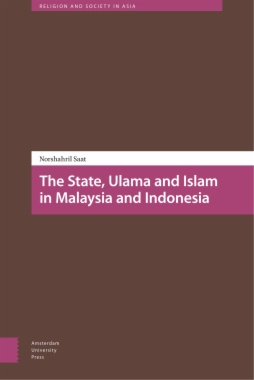The Suharto (1966-98) government of Indonesia and the Mahathir (1981-2003) government of Malaysia both launched Islamisation programmes, upgrading and creating religious institutions. The author argues that, while generally ulamas, or religious teachers, had to support state ideologies, they sometimes succeeded in ŸcapturingŒ the state by influencing policies in their favour. The author builds his argument on strong fieldwork data, especially interviews, and he engages in critical discussion of comparative politics paradigms and the concept of capture.
- Cover
- Table of Contents
- Abbreviations and Acronyms
- A Note on Translation, Spelling, and Other Conventions
- Preface
- 1. Introduction
- Measuring co-optation and capture
- Why “capture” as a theoretical framework?
- Measuring successful capture and co-optation
- Modalities of capture
- Comparing Indonesia and Malaysia
- Book outline
- 2. The Official Ulama in Indonesia and Malaysia
- Emergence, Perception, and Authority
- Defining ulama
- How academics perceive official ulama
- The Majelis Ulama Indonesia (MUI)
- Functions
- Structure
- Centre-regional relations
- Jawatankuasa Fatwa Majlis Kebangsaan Bagi Hal Ugama Islam Malaysia (JKF-MKI)
- Functions
- Structure
- Federal-state (negeri) relations
- JAKIM and IKIM
- Are MUI and MKI comparable?
- 3. The Rise in Piety and the Roots of State Co-optation of the Ulama
- Islamic resurgence: An “Islamic” alternative to Westernisation
- Global factors
- Local factors
- Dakwah groups and their ideologues
- Religious cleavages in Indonesia and Malaysia
- The traditionalist-modernist cleavage in Indonesia
- The rise of Islamism in Malaysia
- Co-opting prominent Muslims and ulama
- Suharto’s symbolic institutionalism: PPP, MUI, and ICMI
- PPP: Uniting Islamic political parties
- MUI: Uniting Indonesian Ulama
- ICMI: Uniting Indonesian intellectuals
- Mahathir’s substantive institutionalism: Centralisation of Islam
- Building a progressive Islam and out-Islamising PAS
- Co-opting ulama and influential Muslims into state structures
- Conclusion
- 4. The Ulama Council of Indonesia (MUI) in the Post-New Order
- A Capture in Progress
- Expanding authority in shariah economics
- DSN-MUI’s push for shariah economics
- Expanding shariah economics beyond banking and finance
- Personalised capture in DSN-MUI
- Can DSN-MUI build on its success?
- Generating income through halal certification
- History of LPPOM-MUI
- Dominating halal-certification procedures
- The tussle between the Religious Ministry and LPPOM-MUI
- What lies ahead for LPPOM?
- Dominating the religious discourse
- Restricting the Ahmadiyah
- Declaring Shias as deviants
- MUI’s internal fragmentation on the Shia issue
- Silencing liberal Muslims
- Moralising media and entertainment
- MUI’s contribution to the Anti-Pornography bill (2008)
- “Moralising” entertainment
- Towards a halal-certified society: MUI’s capture in progress?
- Conclusion
- 5. Malaysian Muftis and Official Ulama
- The State Captured?
- Dominating Islamic discourses
- Limiting who can speak on Islam
- Defining ASWJ
- Treating fatwas as unchallengeable
- Sustaining power to affect policies and other appointments
- Supporting UMNO’s ideology
- Loyalty to the Malay rulers
- Muftis prolonging appointments in institutions
- Shaping and directing state policies: The case of Harussani
- Conversion of minors to Islam
- The “Allah” controversy
- Why can the official ulama defy the state?
- Enhancing authority beyond domains specified by the state
- Securing other influential appointments
- Other revenue related captures
- Halal certification and Islamic economics
- Muftis as senior bureaucrats
- Wither moderate Islam in Malaysia?
- Conclusion
- 6. Conclusion
- The Future of Official Ulama and State Capture
- Contributions to comparative politics approaches
- Critical reflections on official ulama’s struggle
- Bibliography
- List of Interviews
- About the Author
- List of Figures and Tables
- Figure 1 MUI fatwas since 1975
- Figure 2 Fatwas issued by the JKF-MKI from 1970 to 2015
- Figure 3 Fatwas concerning Islamic faith issued by JKF-MKI
- Table 1 Comparing MUI and MKI
- Table 2 Key differences: Symbolic institutionalism and substantive institutionalism
- Table 3 MUI chairman since 1975

